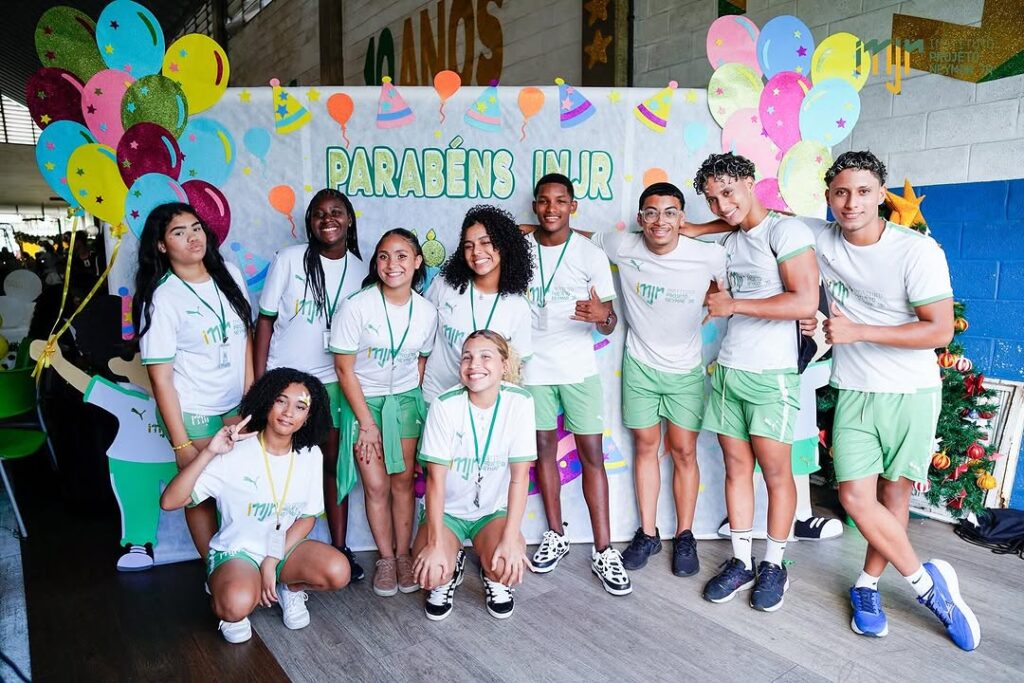O Instituto Projeto Neymar Jr. participou da primeira edição da Demá Cup como instituição observadora, convidado pela empresa de consultoria voltada para projetos sociais com atuação em atividades esportivas, a Advance Inspiring. O evento, que tem como lema “mudar o jogo para transformar vidas” aconteceu no sábado, 23, em Palmas, Tocantins.
Disputado na modalidade de Futebol de 3 Tempos, o evento promove esporte, diálogo e valores, com enfoque na formação cidadã e no protagonismo juvenil. Em caráter experimental, a capital tocantinense foi escolhida para sediar essa primeira edição..

O evento acontece na sede do Sesi, na 901 sul, e é realizado pela Demá, em parceria com a Associação Palmas Jovem, a Renapsi, a Fundação Sagres, o Sistema Sagres e o Palmas Futebol e Regatas.
Quem participa ainda da iniciativa pioneira é o Instituto Neymar, que atuará como instituição observadora no evento. Além de apoiar a realização do torneio teste, o Instituto irá observar todas as etapas evento, fazendo uma imersão na prática do Futebol de 3 tempos, a fim de apoiar as próximas edições da Demá Cup.
Participantes
O evento teste da Demá Cup contará com a participação de educadores e cerca de 40 jovens com idades entre 16 e 18 anos incluindo jovens que estão ingressando no mercado de trabalho, indígenas, pessoas com deficiência e atletas que passam por formação em futebol.
Além do momento de integração dentro do gramado, tanto participantes quanto torcedores e convidados participação de um sorteio de brindes, que incluem uma camisa autografada pelo Neymar, além de aparelhos eletrônicos.
Como funciona o Futebol de 3 tempos
A partida é disputada em três tempos, como o próprio nome sugere. No primeiro tempo atletas e educadores se unem para debater e estabelecer as regras da partida, determinando a divisão das equipes, pontuação, e acordos específicos.
No segundo tempo, começa a partida em si com a aplicação das regras. O educador se torna um mediador e os atletas participantes têm a responsabilidade de cumprir as regras e buscar consenso em eventuais conflitos, praticando valores como o diálogo, a compreensão, tolerância, solidariedade, espírito de grupo, respeito e cumprimento às regras.
Já no terceiro tempo as equipes se unem para fazer uma auto avaliação de como se portaram em relação ao proposto no início da partida. É a oportunidade para que os participantes exprimam seus sentimentos em relação ao jogo e debatam sobre o cumprimento das regras e a postura das equipes durante o processo, cujo objetivo é promover um jogo limpo. Nessa etapa é preenchida uma planilha específica da modalidade e os participantes indicam uma “nota” ao jogo.

Como nasceu a modalidade?
A modalidade nasceu através de um grupo de amigos que após um acontecimento trágico passaram a refletir sobre a importância de resgatar os valores do esporte. O evento que despertou essa reflexão foi o assassinato do zagueiro colombiano Andrés Escobar (capitão da seleção de seu país) após cometer o gol contra que desclassificou a Colômbia da Copa do Mundo de 1994. Com isso, Jürgen Griesbeck, Vladimir Borkovic e Johannes Axster decidiram iniciar essa retomada partindo justamente para a formação cidadã.

Instituto Projeto Neymar Jr. participates in the 1st edition of the Déma Cup as an Observer Institution
The Instituto Projeto Neymar Jr. participated in the first edition of the Déma Cup as an observer institution, invited by the consulting company focused on social projects working in sports activities, Advance Inspiring. The event, whose motto is “change the game to transform lives” took place on Saturday, 23, in Palmas, Tocantins.
Played in the form of 3-stroke football, the event promotes sport, dialogue and values, with a focus on citizen education and youth protagonism. On an experimental basis, the capital of Tocantins was chosen to host this first edition and around 300 people are expected, including athletes and the public.
The event takes place at Sesi’s headquarters, at 901 sul, and is carried out by Demá, in partnership with the Palmas Jovem Association, Renapsi, the Sagres Foundation, the Sagres System and Palmas Futebol e Regatas.
Also participating in the pioneering initiative is the Neymar Institute, which will act as an observer institution at the event. In addition to supporting the test tournament, the Institute will observe all stages of the event, making an immersion in the practice of 3-stroke football, in order to support the next editions of the Demá Cup.
Participants
The Demá Cup test event will feature the participation of educators and around 40 young people aged between 16 and 18, including young people entering the job market, indigenous people, people with disabilities and athletes undergoing football training.
In addition to the moment of integration on the pitch, both participants, fans and guests participated in a giveaway, which included a shirt autographed by Neymar, in addition to electronic devices.
How 3-stroke football works
The match is played in three halves, as the name suggests. In the first half, athletes and educators come together to debate and establish the rules of the match, determining the division of teams, scoring, and specific agreements.
In the second half, the game itself begins with the application of the rules. The educator becomes a mediator and the participating athletes are responsible for complying with the rules and seeking consensus in eventual conflicts, practicing values such as dialogue, understanding, tolerance, solidarity, team spirit, respect and compliance with the rules.
In the third half, the teams come together to make a self-assessment of how they behaved in relation to what was proposed at the beginning of the match. It is an opportunity for participants to express their feelings about the game and discuss compliance with the rules and the attitude of the teams during the process, whose objective is to promote fair play. At this stage, a specific form for the modality is filled in and the participants indicate a “grade” for the game.
How was the sport born?
The modality was born through a group of friends who, after a tragic event, began to reflect on the importance of rescuing the values of the sport. The event that aroused this reflection was the murder of Colombian defender Andrés Escobar (captain of his country’s national team) after committing the own goal that disqualified Colombia from the 1994 World Cup. With that, Jürgen Griesbeck, Vladimir Borkovic and Johannes Axster decided to to initiate this recovery by starting precisely with the formation of citizens.


